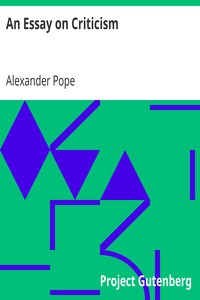An Essay on Criticism by Alexander Pope
"An Essay on Criticism" by Alexander Pope is a major poem published in 1711. Composed in heroic couplets, this verse essay examines how writers and critics should behave in the literary world of Pope's time. The poem offers advice on good criticism while warning against common faults, emphasizing imitation of ancient writers like Homer and Virgil as the ultimate standard for taste. It's the source of enduring quotations including "To err is
human; to forgive, divine" and "Fools rush in where angels fear to tread." (This is an automatically generated summary.)
Read or download for free
| Reading Options | Url | Size | |||
|---|---|---|---|---|---|
| Read now! | https://www.gutenberg.org/ebooks/7409.html.images | 96 kB | |||
| EPUB3 (E-readers incl. Send-to-Kindle) | https://www.gutenberg.org/ebooks/7409.epub3.images | 107 kB | |||
| EPUB (older E-readers) | https://www.gutenberg.org/ebooks/7409.epub.images | 106 kB | |||
| EPUB (no images, older E-readers) | https://www.gutenberg.org/ebooks/7409.epub.noimages | 87 kB | |||
| Kindle | https://www.gutenberg.org/ebooks/7409.kf8.images | 214 kB | |||
| older Kindles | https://www.gutenberg.org/ebooks/7409.kindle.images | 197 kB | |||
| Plain Text UTF-8 | https://www.gutenberg.org/ebooks/7409.txt.utf-8 | 74 kB | |||
| Download HTML (zip) | https://www.gutenberg.org/cache/epub/7409/pg7409-h.zip | 105 kB | |||
| There may be more files related to this item. | |||||
Similar Books
About this eBook
| Author | Pope, Alexander, 1688-1744 |
|---|---|
| Title | An Essay on Criticism |
| Note | Wikipedia page about this book: en.wikipedia.org/wiki/An_Essay_on_Criticism |
| Credits |
Produced by Ted Garvin, David Garcia and the Online Distributed Proofreading Team. |
| Reading Level | Reading ease score: 71.1 (7th grade). Fairly easy to read. |
| Language | English |
| LoC Class | PR: Language and Literatures: English literature |
| Subject | Criticism |
| Subject | Poetry -- Early works to 1800 |
| Category | Text |
| EBook-No. | 7409 |
| Release Date | Feb 1, 2005 |
| Most Recently Updated | Feb 7, 2015 |
| Copyright Status | Public domain in the USA. |
| Downloads | 1785 downloads in the last 30 days. |
| Project Gutenberg eBooks are always free! | |

